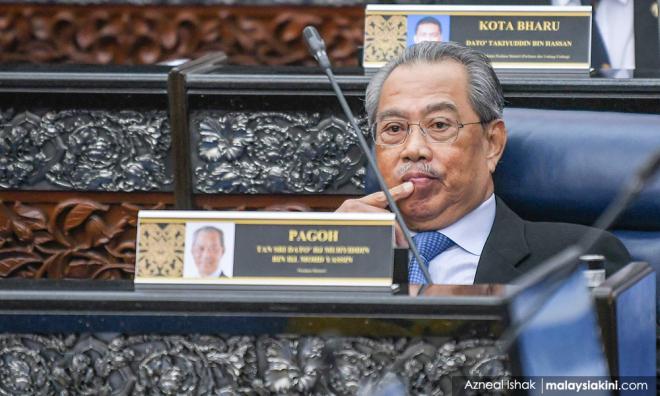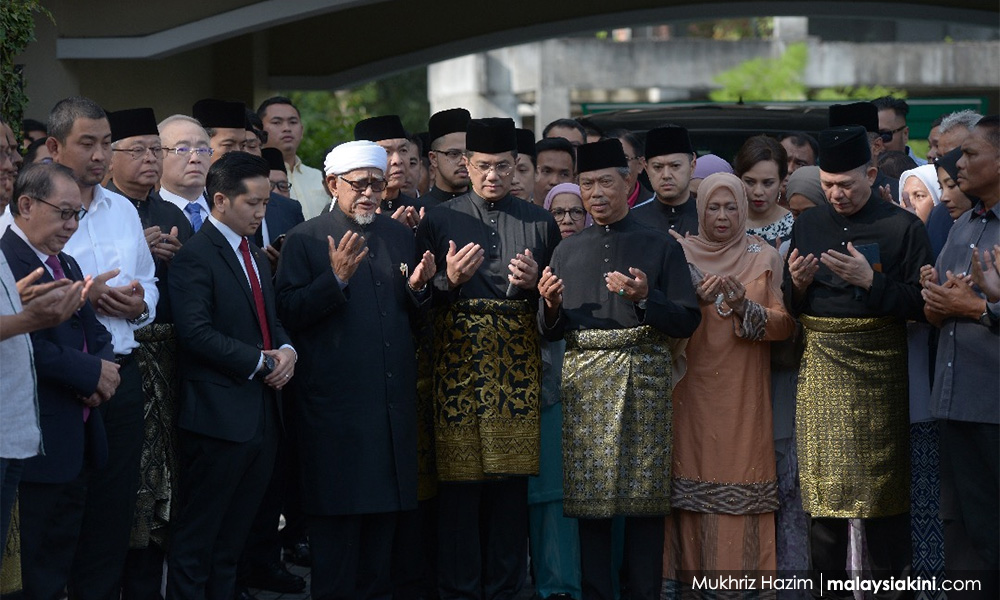
Resolving Malaysia's never-ending political crisis
by Tommy Thomas
COMMENT | The resignation yesterday of a cabinet minister and the withdrawal of support by 11 MPs have finally and conclusively established that Prime Minister Muhyiddin Yassin does not have the support of at least 111 MPs, which is both a legal and political requirement for him to hold and remain in office.
Accordingly, by virtue of our supreme law, that is, Article 43(4) of the Federal Constitution, as the prime minister “ceases to command the confidence of the majority of the members of the” Dewan Rakyat, the prime minister must immediately seek an audience with the Yang di-Pertuan Agong and “shall tender the resignation of the cabinet”.
The prime minister has no other option. He cannot stubbornly cling to the office. His political ship has sunk.
The prime minister advising the Agong, also under Article 43(4), to dissolve Parliament and hold GE15 is not an option during the deadly Covid epidemic which is ravaging Malaysians. Having general elections, with the vigorous campaigning associated with it, is criminally reckless at the present time.
In resolving this political crisis, we should learn the most fundamental error that occurred after Dr Mahathir Mohamad resigned as prime minister on Feb 24, 2020.
Rather than allowing the floor of the Dewan Rakyat to decide on the political future of the nation, as the elected representatives of the people expressed in GE14, the constitutional monarch in late February 2020 interviewed all the MPs on their choice of a new PM to replace Mahathir.
That process did not produce a result: apparently, the highest that a candidate received was 92 votes, well short of the requisite number.
Thus, when Muhyiddin was chosen by the Agong on March 1, 2020, he did not command the confidence of the majority of MPs. From his appointment until today, he has never enjoyed majority parliamentary support.
Hence, his reluctance for Parliament to sit, and the speaker’s refusal to ever table and vote on a motion of no confidence against the sitting prime minister. It is a miracle that he has somehow survived in office for some 17 months: but at what cost to our people and the nation.
The illegitimate origins of the PM’s hold on power must be kept in mind when considering the solution to the current political quagmire: they arose from the inception, and has been worsening over time.

Therefore, another exercise by the head of state interviewing MPs should be avoided at all costs. It will only result in further political instability, and very much a repeat of the problems that have plagued us since Feb 24, 2020.
In consequence, the only solution for the Agong is to direct the PM at their audience, that he should remain temporarily in office (since the nation must at all times have a head of government), but the Dewan Rakyat should sit urgently, say, as early as this Friday to deliberate on motions of no confidence or confidence as the case may be.
Such a direction from the palace must occur regardless of whether the prime minister resigns, simply because he has lost the confidence of the majority of the MPs.
In this way, the 220 MPs must debate, deliberate, horse-trade, bargain and finally reach a majority decision of at least 111 of them of our political future. This is done in most parliamentary democracies.
There is nothing novel if this occurs. Parliamentarians are our elected leaders, and they must be allowed to openly and freely decide on the floor and the corridors of the Dewan Rakyat of the government that they desire.
If the outcome is a grand coalition of all political parties under an acceptable prime minister, so much the better.
Never in our post-Merdeka history, have we required so desperately competent, professional, honest, accountable, listening, and good government.
With our one million cases of Covid-19, over 8,000 deaths and the resulting health, economic, financial, and social crisis, we deserve a working, stable political coalition.
It is the paramount duty of the 220 MPs to stitch a working government that can take us out of this crisis. Give them an opportunity to exercise that responsibility for the public good.
TOMMY THOMAS is the former attorney-general.
by Tommy Thomas
COMMENT | The resignation yesterday of a cabinet minister and the withdrawal of support by 11 MPs have finally and conclusively established that Prime Minister Muhyiddin Yassin does not have the support of at least 111 MPs, which is both a legal and political requirement for him to hold and remain in office.
Accordingly, by virtue of our supreme law, that is, Article 43(4) of the Federal Constitution, as the prime minister “ceases to command the confidence of the majority of the members of the” Dewan Rakyat, the prime minister must immediately seek an audience with the Yang di-Pertuan Agong and “shall tender the resignation of the cabinet”.
The prime minister has no other option. He cannot stubbornly cling to the office. His political ship has sunk.
The prime minister advising the Agong, also under Article 43(4), to dissolve Parliament and hold GE15 is not an option during the deadly Covid epidemic which is ravaging Malaysians. Having general elections, with the vigorous campaigning associated with it, is criminally reckless at the present time.
In resolving this political crisis, we should learn the most fundamental error that occurred after Dr Mahathir Mohamad resigned as prime minister on Feb 24, 2020.
Rather than allowing the floor of the Dewan Rakyat to decide on the political future of the nation, as the elected representatives of the people expressed in GE14, the constitutional monarch in late February 2020 interviewed all the MPs on their choice of a new PM to replace Mahathir.
That process did not produce a result: apparently, the highest that a candidate received was 92 votes, well short of the requisite number.
Thus, when Muhyiddin was chosen by the Agong on March 1, 2020, he did not command the confidence of the majority of MPs. From his appointment until today, he has never enjoyed majority parliamentary support.
Hence, his reluctance for Parliament to sit, and the speaker’s refusal to ever table and vote on a motion of no confidence against the sitting prime minister. It is a miracle that he has somehow survived in office for some 17 months: but at what cost to our people and the nation.
The illegitimate origins of the PM’s hold on power must be kept in mind when considering the solution to the current political quagmire: they arose from the inception, and has been worsening over time.

Therefore, another exercise by the head of state interviewing MPs should be avoided at all costs. It will only result in further political instability, and very much a repeat of the problems that have plagued us since Feb 24, 2020.
In consequence, the only solution for the Agong is to direct the PM at their audience, that he should remain temporarily in office (since the nation must at all times have a head of government), but the Dewan Rakyat should sit urgently, say, as early as this Friday to deliberate on motions of no confidence or confidence as the case may be.
Such a direction from the palace must occur regardless of whether the prime minister resigns, simply because he has lost the confidence of the majority of the MPs.
In this way, the 220 MPs must debate, deliberate, horse-trade, bargain and finally reach a majority decision of at least 111 of them of our political future. This is done in most parliamentary democracies.
There is nothing novel if this occurs. Parliamentarians are our elected leaders, and they must be allowed to openly and freely decide on the floor and the corridors of the Dewan Rakyat of the government that they desire.
If the outcome is a grand coalition of all political parties under an acceptable prime minister, so much the better.
Never in our post-Merdeka history, have we required so desperately competent, professional, honest, accountable, listening, and good government.
With our one million cases of Covid-19, over 8,000 deaths and the resulting health, economic, financial, and social crisis, we deserve a working, stable political coalition.
It is the paramount duty of the 220 MPs to stitch a working government that can take us out of this crisis. Give them an opportunity to exercise that responsibility for the public good.
TOMMY THOMAS is the former attorney-general.
No comments:
Post a Comment